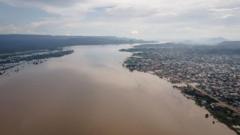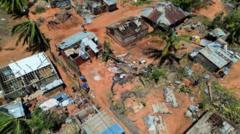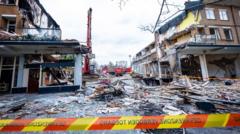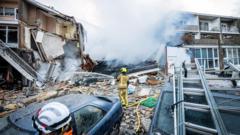With over 50 confirmed fatalities and countless others missing following the capsizing of a boat on the River Niger, the tragedy has once again spotlighted the persistent safety issues plaguing Nigeria's transport infrastructure.
Nigeria Boat Tragedy: Over 50 Confirmed Dead, Dozens Missing

Nigeria Boat Tragedy: Over 50 Confirmed Dead, Dozens Missing
A devastating boat accident reveals systemic safety failures on Nigeria's water highways.
The River Niger, a vital artery in Nigeria, has become the site of tragedy as over 54 bodies have been recovered from a boat accident that occurred early Friday. The ill-fated vessel, reportedly carrying more than 200 passengers, capsized while en route from Kogi state to a weekly market in Niger state. Amidst the chaos, only 24 individuals were rescued, with some hospitalized, while many remain unaccounted for.
The search efforts, involving divers scouring the waters, reveal a deepening sense of despair as hopes dim for finding more survivors. Historical context reveals that this incident is far from isolated; it marks the third significant boat tragedy in Nigeria within the last two months. Past accidents have included a wooden canoe overloaded with close to 300 passengers, leading to nearly 200 fatalities, and a collision that claimed five lives just last week.
Authorities are grappling with the complexities of this tragedy, particularly the lack of oversight and accountability in passenger safety. Local officials have expressed frustrations over the absence of a passenger manifest, complicating efforts to ascertain the full extent of the disaster. Justin Uche, the Kogi state official in charge of emergency management, underscored the challenges posed by inadequate record-keeping and the time of the accident.
In response to the calamity, Kogi state governor Usman Ododo has ordered healthcare facilities to provide comprehensive support to survivors, emphasizing the need for adherence to safety regulations to prevent such incidents from recurring. Despite governmental calls for reform, experts continue to lament that safety protocols are often overlooked, fueling a cycle of tragic accidents on Nigeria's waterways.
The ongoing crises emphasize not just the immediate loss, but also the urgent necessity for systematic change to enhance public safety on Nigeria's inland waterways, a challenge that is intertwined with broader issues of infrastructure and governance in the nation.
The search efforts, involving divers scouring the waters, reveal a deepening sense of despair as hopes dim for finding more survivors. Historical context reveals that this incident is far from isolated; it marks the third significant boat tragedy in Nigeria within the last two months. Past accidents have included a wooden canoe overloaded with close to 300 passengers, leading to nearly 200 fatalities, and a collision that claimed five lives just last week.
Authorities are grappling with the complexities of this tragedy, particularly the lack of oversight and accountability in passenger safety. Local officials have expressed frustrations over the absence of a passenger manifest, complicating efforts to ascertain the full extent of the disaster. Justin Uche, the Kogi state official in charge of emergency management, underscored the challenges posed by inadequate record-keeping and the time of the accident.
In response to the calamity, Kogi state governor Usman Ododo has ordered healthcare facilities to provide comprehensive support to survivors, emphasizing the need for adherence to safety regulations to prevent such incidents from recurring. Despite governmental calls for reform, experts continue to lament that safety protocols are often overlooked, fueling a cycle of tragic accidents on Nigeria's waterways.
The ongoing crises emphasize not just the immediate loss, but also the urgent necessity for systematic change to enhance public safety on Nigeria's inland waterways, a challenge that is intertwined with broader issues of infrastructure and governance in the nation.




















